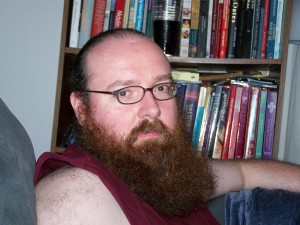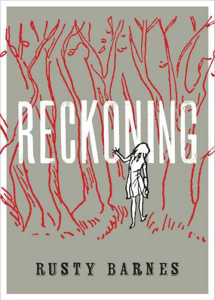Rusty grew up in rural northern Appalachia. He received his B.A. from Mansfield University of Pennsylvania and his M.F.A. from Emerson College. His fiction, poetry and non-fiction have appeared in many places. After editing fiction for the Beacon Street Review (now Redivider) and Zoetrope All-Story Extra, he co-founded Night Train, a literary journal which has been featured in the Boston Globe, The New York Times, and on National Public Radio. MiPOesias published two chapbooks of poetry Redneck Poems and Broke, and Cruel Joke Press published his poetry collection, I Am Not Ariel. Sunnyoutside Press has published two collections of his fiction, Breaking it Down, Mostly Redneck, as well as the novel Reckoning. Having just had the great pleasure of reading the latter, that’s mostly what this interview will be about.
Bonnie ZoBell: Welcome, Rusty. I thoroughly  enjoyed Reckoning, so much mystery and illicit stuff happening in this small, Appalachian town with your honest and down-to-earth narrator. You know your setting, which is something very important to me in fiction. I like to feel like I’m there, too, like I AM the main character. I actually felt a little tired, too, with all the walking your main character, 14-year-old Richard Logan, has to do since his home is so far away from where anything else is happening. Is this a made-up setting, or a place you’re familiar with?
enjoyed Reckoning, so much mystery and illicit stuff happening in this small, Appalachian town with your honest and down-to-earth narrator. You know your setting, which is something very important to me in fiction. I like to feel like I’m there, too, like I AM the main character. I actually felt a little tired, too, with all the walking your main character, 14-year-old Richard Logan, has to do since his home is so far away from where anything else is happening. Is this a made-up setting, or a place you’re familiar with?
Rusty Barnes: Thanks, Bonnie, and thanks for interviewing me. The setting is completely real. It’s where I grew up. I should add a caveat that I did not treat it as reality; I inserted creeks and rivers and roads and farms that exist only in my mind if they served the fiction better than the reality. I have maps of both counties I grew up in, but I generally don’t need them when I’m writing. I spent twenty-one years married to the place, and that’s where nearly all my published fiction and poetry come from, ultimately. Like the western writer Louis L’Amour said of his fiction, if you know where to go, you can find every spring, creek and farm I write about. Some of them switch their fictional location, others change to protect the innocent and the guilty.
BZ: Richard’s dreams seem to come true right at the beginning—as he’s out driving a plow and shooting woodchucks with a .22 on Old Man Thompson’s field to earn a few extra dollars, he discovers his boss, whom he doesn’t much like, and a new woman in town having relations. The woman is buck naked. The thrill of it made me feel like I was a fourteen-year-old boy. Is it easy to get in touch with your inner boy?
RB: Inside, I’m a fourteen-year old boy. Easy is an understatement. I can recollect how I felt at every age pretty well, up until age 30. Everything runs together after that.
BZ: Before too long, the real and brutal mystery that’s at the center of the book comes up. Richard and some friends discover another naked woman—this one badly beaten and unconscious. They rush for help. You do a wonderful job of keeping this mystery front and center throughout the book. Was that hard to do? Any advice for those who struggle with conflict in their work?
RB: Literary fiction, which I was aspiring to while writing this, rarely has anything of substance conflict-wise. It’s all in the writing skill, and I feared and still fear I don’t have much of that. I’m a journeyman writer, not the kind who will win awards. I tried very hard to keep some action going throughout the book, though, so I’m glad it came through. I work with two main ideas from two very different writers. The first was William Martin, who visited my novel-writing class twenty-odd years ago: he said, when something in your narrative is in doubt, or you’re stuck somehow for anything to write about next, blow something up. It sounds strange and too glib, but it really works. There are many kinds of blow-ups. The other writer whose advice I take is Larry Brown’s: he said, keep your character in trouble, just pile it on her. Both worked for me in Reckoning.
BZ: This isn’t the type of high-crime one expects to find in rural towns. Or is that a stereotype? Along these lines, you have a site called Fried Chicken and Coffee: a blogazine of on-off rants, rural, working class and Appalachian concerns. (One time when I visited you there, you kindly told me I could be an honorary redneck, which I want you to know I deeply appreciate.) One of the headlines on this site is “Meth Labs in West Virginia?! You’re Kidding,” by Nick Kepler and dated January 17, 2015. Is there just as much crime these days in tiny hamlets as there is in big cities? It sounds like the same kind of crime, too.
RB: Well, crime is crime. The typical crime novel or novel that uses a rural setting and gets dark in tone uses meth as the crime that’s everywhere. That’s still true to some extent, but heroin, for instance, is now making itself the drug of choice in many rural areas. I don’t know if there are many professional pornographers in Appalachia, though I imagine it’s something traveling under the tree line like other imported problems. I didn’t answer your question really. Crime is a growing problem in my part of Appalachia, the northern extremes. The fracking industry brings with its exploding population and high rents a lot of money and a lot of crime. Gas workers tend to be transient, and the more you move around from job to job, the less chance you have of getting caught in your small thefts, it seems to me.
BZ: Richard tells us he has a pretty hard-nosed father, which we see some evidence of, and yet his dad also seems pretty lenient about some of the questionable friendships Richard develops. Do you think this is smart of him? Do you think of your own kids when you’re writing about a kid this young? Are you hard-nosed?
RB: My father hit the balance just about the way you should. I knew by age 7 or 8 what was right and what was not, and I could parse out the friends I made on that basis for the remainder of my childhood. I was lucky in that I could hang out in many different social circles. That also meant I didn’t have any close-close friends except the ones I made in Boy Scouts, which was a big part of life for me for many years, but I could hang out with the smart kids as well as the dumb, and I could travel on the periphery of the bad kids too, on the edge of propriety, because of where I grew up. They knew I was a solid citizen who wouldn’t rat anyone out. I could hang out at the smoking barrel and then transition into AP English pretty easily. I grew up in a situation Libertarians would approve of. I learned early on that my right to swing my fist ends where my neighbor’s nose begins. Basically, in high school, I liked to be left alone and would not encroach on someone else’s desires to do the same thing. I still believe that.
I am not hard-nosed, no. I trusted my kids pretty early with info they wouldn’t have gotten elsewhere. I make sure if I can that they have every advantage when it comes to knowing how the world works. My wife—so important to have a good partner if you can manage it—is more hard-nosed than I am, but we team up pretty well on matters of discipline and proper timing of revealed information. I had a pretty good idea that I would be able to trust them with any information without much trouble.
BZ: You’re from rural northern Appalachia but you live in Boston now. Which place are you more comfortable in? Do you think you’ll ever write about Boston? (Or maybe you have and I haven’t read it.)
RB: I’m an outsider in both places. At home in PA, I still feel like a college kid; in Boston, I’m a redneck. I’m not really comfortable in either place. We’ll be in Boston and surrounds for a long time yet, though. We bought a house within a stone’s throw of the ocean in Revere, MA, and I’d be a fool to give that up to go to back to PA, a place that’s changed irrevocably since I left.
As for writing about Boston/Revere, I have done a bit of it. Most of the non-redneck stories in Mostly Redneck involve Boston, maybe a third of the total number of pages. I have a chapbook of poems titled Revere Poems, which I’ll keep adding to as the poems happen, and when I get to a goodly amount of them, I’ll winnow it down and start sending it out for publication. That’s a long way away right now though.
BZ: What are you working on now?
RB: I have a novel, the first book of which is finished at 140 pages, and am moving through slowly but surely to the end, which will be a shorter second book, maybe 120 pages or so, and also the chapbook manuscript I mentioned in the last question. Lots of poems to send out too. I always have lots of those. Strangely, though my best-selling book is my collection of flash fiction, Mostly Redneck, I haven’t written any flash in ages. I may do some of that once the novel’s in the bag.


Leave A Comment